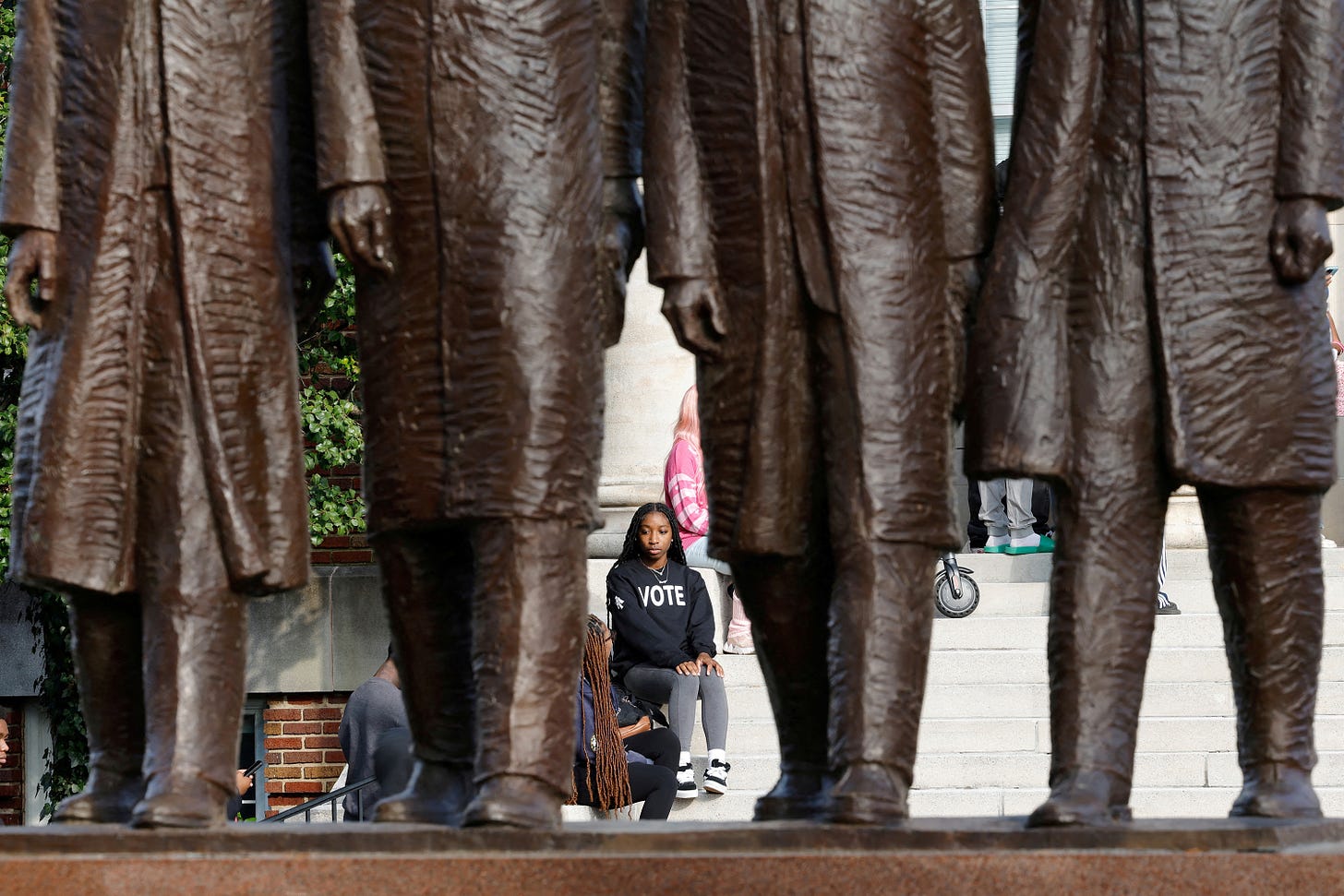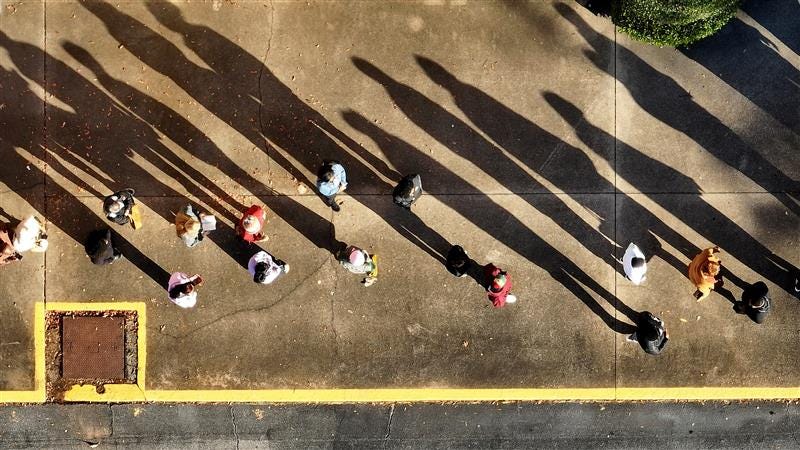Announcements of the Nobel Prize in Economics are generally exciting only for insiders. Few regular folk are conversant in the arcane econometrics and statistical methods that course through the mathematical models of the discipline. This year has been different. The three co-winners have written books in a language that even a non-economist can understand. They aren’t hiding behind formal models. They draw on qualitative approaches, especially theories of institutions. Yet despite all this they are still on shaky intellectual ground, argues Yuen Yuen Ang for The Ideas Letter. The Alfred Chandler Professor of Political Economy at Johns Hopkins goes to town on what our Nobel recipients get wrong, not to mention the perils of their assumptions.
We are also featuring the Kenyan writer and political analyst, Nanjala Nyabola, as she reflects on the shambolic electoral moment in the US. As at least a few of you may have heard, Tuesday November 5 is election day in America. Having Nyabola’s outsider interpretation of this (potentially) culminating moment is a treat and an honor.
And Sohrab Ahmari, who appears everywhere these days (so in demand is the fine writer’s wisdom), offers a response to last issue’s essay of Bhaskar Sunkara on social democracy and class. Sunkara himself would have responded immediately were that pesky US election not in the mix. Expect something from his pen in a few weeks’ time.
Leading off our curated content is a plaintive piece from New Lines Magazine about the eminent Egyptian sociologist Saad Eddin Ibrahim and his valiant efforts to locate a democratic future for Egypt. We follow with a conversation between Columbia comparative literature professor Brent Edwards and the writer Adam Shatz, whose recent intellectual biography of Frantz Fanon has deservedly won accolades far and wide. They discuss Aimé Césaire, a powerful figure for Fanon, and an esteemed Martiniquais poet, politician and intellectual.
We continue with a meditation on knowledge, climate change, Mongolia, and social science from Iza Ding, a story that is as lovely as it is distinctive.
Our close partner, Africa is a Country, is up next, with a fascinating if chilling report about the weird (or perhaps not) congruence between ex-South African entrepreneurs and American capitalism. Caveat Emptor: there’s some of that dastardly Elon Musk in the piece.
The neo-monarchist, anti-liberal Curtis Yarvin, ideologist to Peter Thiel, is considered by many to be a Darth Vader of contemporary ideas. Paris Marx and Julia Black discuss his relevance to contemporary debates; they may be critical but you’ll be up to snuff on the Yarvinian worldview after listening.
Finally, in the wake of the Georgian election last Saturday, Bryan Gigantino bucks received wisdom of the either-or choice that allegedly awaits Georgia’s future and asks, can it not be both/and? Why must we always interpret political futures through an insular Cold War prism? His piece is a tonic to that one-dimensionality.
Musically, we are featuring an early trio release by the piano virtuoso, Chick Corea, “Now He Sings, Now He Sobs,” from Chick's record of the same name. With Miroslav Vitouš on bass and Roy Haynes (becoming a centenarian in March!) on drums, this 1968 release blew the minds of some listeners who were becoming acclimated to a more popularized late-60s soul-jazz sound. Its beauty and complexity demand repeated listening.
Our next issue will be our first as a brand-spanking new bells and whistles website. We are eager for your thoughts on it. Not to worry, you remain on our mailing list to receive notification of every new issue. It's just going to look a whole lot more appealing.
—Leonard Benardo, senior vice president at the Open Society Foundations
1. The 2024 Nobel Laureates Are Not Only Wrong About China, But Also About the West – Yuen Yuen Ang, The Ideas Letter
Ang critiques this year’s Nobel-winning economists Acemoglu, Johnson, and Robinson for attributing Western prosperity solely to "inclusive, non-extractive" institutions, overlooking the role of colonial exploitation in building wealth. She argues that their approach idealizes Western democracies, and dismisses successful alternative governance models, like China's, as anomalies. Instead, democracy should be promoted due to its intrinsic values, while diverse paths to development in a multipolar world should be respected.
“The ideologizing of capitalist democracy is distorting. When translated into development programs, it invariably becomes top-down, one-size-fits-all campaigns that disempower the poor. Not only that, it has blinded the establishment from detecting long-simmering problems in Western capitalism and democracy. Corruption studies is a case in point. By consistently measuring rich democracies as clean and poor countries as corrupt, elites failed to see that the flourish of “access money” (legalized elite exchanges of power and profit) in rich countries was angering citizens and pushing them toward populism.”
2. A Ballot and a Last Breath – Nanjala Nyabola, The Ideas Letter
Nyabola contrasts the sacredness and significance of voting, particularly among marginalized communities, with the transactional, power-driven nature of electoral politics in the U.S. today. She critiques the limitations of the two-party system and highlights what she considers moral compromises of major candidates in the presidential race, focusing on Harris’ foreign policy – particularly on Gaza – and Trump’s blatant corruption. The author questions whether U.S. elections can truly honor the commitment of voters who see voting as a deeply meaningful act.
“As a Kenyan, I have been witnessing the slow but almost certain destruction of my own country under an administration accused of abducting its opponents and firing on protesters on an unprecedented scale. Yet I do not envy U.S. voters. Their two presidential candidates are not equivalent, but having to choose between them nonetheless must trigger a sort of despair ...”
3. Social Democracy, Immigration and the Working Class, Sohrab Ahmari, The Ideas Letter
Ahmari grapples with Sunkara’s argument that social democracy lost worker support by prioritizing capital interests, pushing laborers to seek better political representation. But, Ahmari problematizes Sunkara’s dismissal of a strategy that would accommodate popular discontent with liberalism, particularly migration. This approach is “common electoral and political-economic sense,” he argues.
“In other words, opposition to mass, low-wage migration isn’t an expression of working-class people’s irrational or atavistic cultural illiberalism, as Sunkara implies. It’s part of a rational calculation that in a primarily services-based economy, high migrant flows diminish what little bargaining power native-born workers enjoy. Newcomers who lack language proficiency and fret about their legal status aren’t going to organize to push back against management; they aren’t going to turn to federal regulators to complain about wage theft and abysmal working conditions.”
4. The Contradictory Legacy of an Egyptian Sociologist - Daanish Faruqi, New Lines Magazine
Egyptian sociologist Saad Eddin Ibrahim dedicated his life to fighting for democracy and human rights in his country, but ended up endorsing an authoritarian government. A long-time advocate of including Islamist groups in democratic processes, he pioneered civil society efforts in Egypt, often at personal risk, drawing intellectual inspiration from the 14th-century scholar Ibn Khaldun. However, after the 2013 Rabaa massacre, Ibrahim unexpectedly supported the military regime of Abdel Fattah el-Sisi, publicly justifying its actions. Faruqi embarked on an investigation of Arab liberalism, and found it is constructed upon an authoritarian contradiction: faced with populations unwilling to adopt liberal ideals, proponents of liberalism forged authoritarian alliances.
“Ibrahim’s inconsistency is especially baffling given his debt to the legacy of Ibn Khaldun. ... Ibrahim interpreted the Khaldunian paradigm as requiring that every new social movement, if it hopes to offer tangible political outcomes, must offer an alternative king and pope, to replace a currently decaying king and pope. ... [Ibrahim] he emphasized the appeal of a social movement capable of offering a vision of a lost ideal to the downtrodden. Islamism, in his estimation, offered precisely that vision, however reactionary it arguably was. Egyptian liberalism, on the other hand, offered no competing spiritual or emotional force. ...The project of Egyptian liberalism has fallen short in large part because it has failed to appreciate that religious mission, or to offer an alternative king and pope to the Egyptian people. Rather, it had no place for religious actors of any kind in the public sphere. Faced with the choice, the Egyptian people have repeatedly rejected that proposition.”
5. Human Conditions: ‘Discourse on Colonialism’ by Aimé Césaire - Brent Hayes Edwards and Adam Shatz, Close Readings
Edwards and Shatz discuss Martiniquais poet and politician Aimé Césaire’s 1950 essay Discourse on Colonialism, a groundbreaking work of 20th-century anti-colonial thought and a precursor to the writings of Césaire’s protégé, Frantz Fanon. They highlight how Césaire’s Notebook of a Return to the Native Land reclaims negative terms and explores identity through a deep, often painful engagement with the history of blackness, colonialism, and personal transformation. They go on to explore Césaire’s Négritude, the far-reaching movement of black consciousness he founded with Léopold Sédar Senghor and Léon Damas, as well as Césaire’s broader ambition to define Caribbean identity as globally connected, contrasting the common perception of the islands as isolated from global history.
"And in the way the speaker of The Notebook proceeds, it's not enough to just say, I reject the negative terms. Black is beautiful. I'm proud of myself. Césaire, on the contrary, says we have to wallow in negativity. We have to get down. There's a culminating point about a third of the way through the poem where the speaker says, I find a man lying flat on the ground. I have to get down to the bottom of my self-hatred, of my internalized racism, in order to come out on the other side. And so rather than pretending I can forget about the negativity of the past of enslavement and colonization, I have to dig down into it and recognize my own complicity in it in order to think myself, to dream myself, to push myself beyond it and to get to a place where I can take a term that still has that complicated negative baggage and make it into a positive term without forgetting the negativity, but making it into a term that we can rally around.”
6. Tangible Knowledge: Climate change in pastoral Mongolia – Iza Ding, Berlin Journal
Ding critiques the conventional "knowledge" frameworks that often marginalize local lived experience in favor of Western scientific language – focusing on how these may lead to misguided climate "solutions”. She questions Western models that posit environmental concerns as priorities that emerge in post-modern societies, that have passed basic survival mode.
But, “I doubt many college-educated liberals living in the OECD world voting for green parties could get so detailed and empirical about “climate change” as these Mongolian herders do. Herders know better than anybody else about the climbing of temperature, the drying of rangeland, the flooding of rivers, the dwindling of plant and animal species, and the unfolding collapse of ecosystems. It didn’t take me much time to realize that it’s not that herders are oblivious or nonchalant about the consequences of climate change; it’s just that they have never heard the phrases “climate change,” or “global warming,” or “renewable energy”—all foreign jargon translated from English.”
7. The mine dumps of Silicon Valley -- Efthimios Karayiannides, Africa is A Country
Karayiannides complicates the facile narrative that explains the relatively high number of “white South Africans among dot-com moguls turned conservative crusaders against liberalism” with their home country’s history of institutionalize racism. He instead points to South Africa’s mix of corporate capitalism and social reform ideologies at the turn of the 20th century.
"While it might be cathartic to compare Musk’s tech firms to apartheid-era mines, the connection between South African engineers and American capitalism is a more complicated one. It must be viewed as a part of the evolution of expertise in the American century. It has to do with the transformations of capitalist firms, their regulatory environment, and experts’ navigation of both. It also has to do with the global diffusion of experts.”
8. The “Dark Elf” Leading Tech’s Extreme Right – Julia Black, Tech Won’t Save Us
Paris Marx is joined by Julia Black to discuss how Curtis Yarvin's anti-democratic ideas, once niche, have gained significant influence among Silicon Valley elites, especially in recent years, highlighting themes like opposing democracy, dismantling the "Deep State," and controlling the media to serve state agendas.
“He is ... very largely responsible for a movement that is called sometimes the “dark enlightenment” and sometimes “neoreactionary thinking” and basically what it boils down to is fundamental anti-democracy thinking, anti-egalitarian thinking and this idea that society is meant to be run by elites, that some people are better than others and we should embrace that.”
9. In Georgia, a National Election Is a Geopolitical Struggle – Bryan Gigantino, Jacobin
Georgia’s election last week reflects a deeper geopolitical struggle between Western alliances and local interests, as the ruling party Georgian Dream seeks to balance EU integration with economic ties to Russia and China. With polarized views on sovereignty, EU membership, and influence from NGOs, the election was also a referendum on the country’s alignment amid shifting global dynamics. This tension is heightened by Georgian Dream’s shift toward cultural conservatism and ambivalence over full EU integration, challenging Georgia’s long-standing Euro-Atlantic orientation.
“A growing political, yet ideologically eclectic, chasm between Atlanticists and US-skeptics is widening in Europe and beyond. Many states around the world are embracing “functional neutrality” toward great-power conflicts to avoid the shocks and uncertainties alignment brings. Tbilisi’s neutrality over Ukraine may sit uneasily with Georgian Dream’s stated goal of EU membership, but the war’s end could drastically change the EU and South Caucasus alike. Already today, tensions over the meaning of sovereignty, Europe, and the West are polarizing ideas about Georgian political identity, just as they are in the EU.”
What is The Ideas Letter
The Ideas Letter is a publication that prizes the unconventional. We find and commission pieces that take time to digest because they don’t have easy conclusions. We won’t try to convince you of anything—other than that the world is complex and reality ever-shifting—because we are not in the business of persuading. We are not here to advocate. What you will find, and we hope embrace, are contributions from across ideological aisles, from a broad range of disciplines and a true cross-section of thinking. If catholicity is your métier, and you are uneasy with banging the drum but would rather hear its many sounds, this is the place for you.
We also really like critique. Not critique that’s mean-spirited or spiteful, but rather critique that raises tough questions, unpacks assumptions, sometimes calls people on the carpet, and always provides opportunity for debate. That is what we are really after—facilitating, augmenting, furthering, and bolstering debate and thinking around issues of consequence. You’ll find here articles, essays, and criticism that will challenge you to think. While we are an English-language digest, we will feature translated pieces from all over the world. And pieces sourced from the widest array of places possible. Let us know what you think, and make sure to tell a friend. Or even someone with whom you disagree!
Thank you for joining us on this intellectual endeavor.
The Ideas Letter staff sifts through a wide range of content to select the articles featured in each issue, with the assistance of The Syllabus, a knowledge curation platform. Suggestions and comments from subscribers are most welcome.








It is not a bad thing people are "pushed towards populism". It is the appropriate natural reaction. In The UK Corbyn is populist, and Bernie Sanders in the USA, we do not have such an option high up on the menu in egalitarian little old New Zealand, shockingly, although our culture is a lot more generally populist. If the writer was referring to right-wing populism, that's what we call fake populism, it represents a set of policies popular among the upper class and petite bourgeoisie.